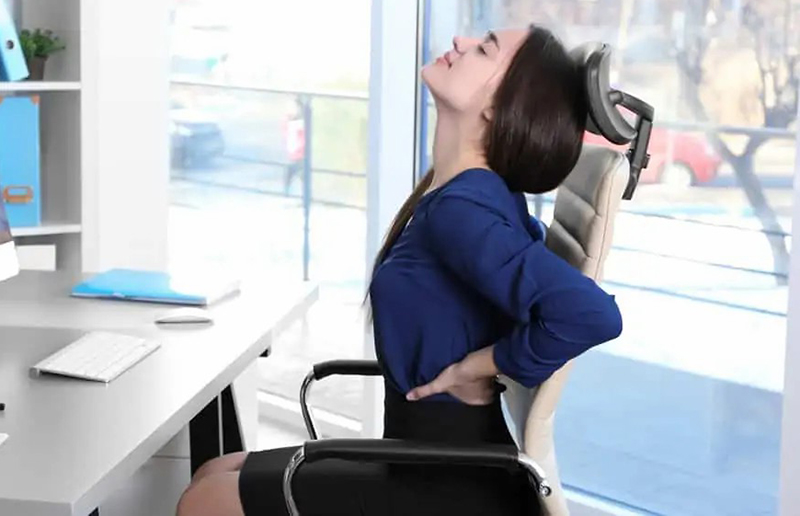
Neck pain can be a debilitating condition that affects people of all ages and lifestyles. It can disrupt daily activities, hinder productivity, and impact overall well-being. Understanding the causes of neck pain is the first step toward finding effective treatment strategies.
Causes of Neck Pain:
1. Muscle strain: Neck muscles can become strained due to poor posture, repetitive movements, or sudden excessive strain. This can occur from activities such as long hours of sitting at a desk, poor sleeping positions, or carrying heavy bags on one shoulder.
2. Poor ergonomics: Prolonged sitting or working in positions that strain the neck, such as slouching or craning the neck forward, can lead to muscle imbalances and pain. Incorrect positioning of computer screens, keyboards, and chairs can contribute to poor ergonomics.
3. Injury or trauma: Accidents, falls, or sports-related impacts can result in neck injuries, including whiplash. These injuries can damage the soft tissues, ligaments, or discs in the neck, leading to pain. Whiplash occurs when the head is jerked backward and then forward suddenly, causing strain on the neck.
4. Herniated discs: The discs that act as cushions between the vertebrae can herniate or bulge, pressing on nearby nerves and causing neck pain. This can occur due to wear and tear, degenerative disc disease, or injury.
5. Arthritis: Osteoarthritis, which is caused by the wear and tear of the joints, or rheumatoid arthritis, an autoimmune condition, can affect the neck joints, leading to pain, stiffness, and reduced mobility. Cervical spondylosis is a form of arthritis that affects the neck vertebrae.
6 Pinched nerves: Nerves in the neck can become compressed or pinched due to conditions like cervical radiculopathy or cervical spinal stenosis. This can occur from herniated discs, bone spurs, or narrowing of the spinal canal, leading to neck pain and radiating symptoms into the arms or hands.
7. Stress and tension: Emotional or mental stress can cause muscle tension in the neck and shoulders, leading to pain and discomfort. Prolonged stress can contribute to chronic neck pain.
Treatment for neck pain can vary depending on the underlying cause and severity of the symptoms. Here are some effective neck pain treatments:
1. Stretching and exercises: Along with using a neck massager, incorporating specific stretching and strengthening exercises into your routine can help alleviate neck pain. Consult with a physical therapist or healthcare professional to learn proper techniques and exercises that target the neck muscles and improve flexibility and strength.

2. Posture correction: Poor posture is a common contributor to neck pain. Focus on maintaining good posture throughout the day, whether sitting, standing, or using electronic devices. Avoid prolonged periods of looking down at your phone or computer screen. Use ergonomic supports, such as an ergonomic chair or a supportive pillow, to maintain proper alignment of the neck and spine.

3. Hot and cold therapy: Applying heat or cold to the neck can help reduce pain and inflammation. A hot water bottle, heating pad, or warm towel can be used for heat therapy, while ice packs or cold compresses can be applied for cold therapy. Alternate between heat and cold treatments based on your comfort and the specific nature of your pain.

4. Lifestyle modifications: Making lifestyle changes can also contribute to neck pain relief. Avoid activities that strain the neck and shoulders, take frequent breaks if you have a sedentary job, and engage in regular physical activity to promote overall fitness and flexibility.

5. Ergonomic adjustments: Ensure that your workstation, including your chair, desk, and computer setup, is ergonomically designed to minimize strain on the neck and shoulders. Adjust the height of your chair, position your monitor at eye level, and use a supportive chair with proper back and neck support.

6. Stress management: Stress and tension can contribute to neck pain. Engaging in stress-reducing activities such as meditation, deep breathing exercises, yoga, or other relaxation techniques may help alleviate neck pain caused by muscle tension.

7. Use a professional neck massager: The Pangao neck massager typically uses low-frequency pulse, heat therapy, red light, magnetic effect to provide relief. It is designed to target the muscles in the neck and shoulders, promoting relaxation, reducing muscle tension, and increasing blood circulation in the area. Pangao neck massager provides advantages in terms of targeted massage, portability, convenience, and relaxation, make it a popular choice for individuals seeking relief from neck pain and muscle tension.
8. Professional help: If your neck pain persists or worsens despite self-care measures, it's important to consult a healthcare professional, such as a doctor, physical therapist, or chiropractor. They can assess your condition, provide a proper diagnosis, and recommend additional treatments or interventions based on your specific needs.

Subscribe means that you have read and agree to the Privacy Policy.
Subscribe means that you have read and agree to the Privacy Policy.
Copyright © Shenzhen Pango Medical Electronics Co.,Ltd, Ltd. All Rights Reserved.